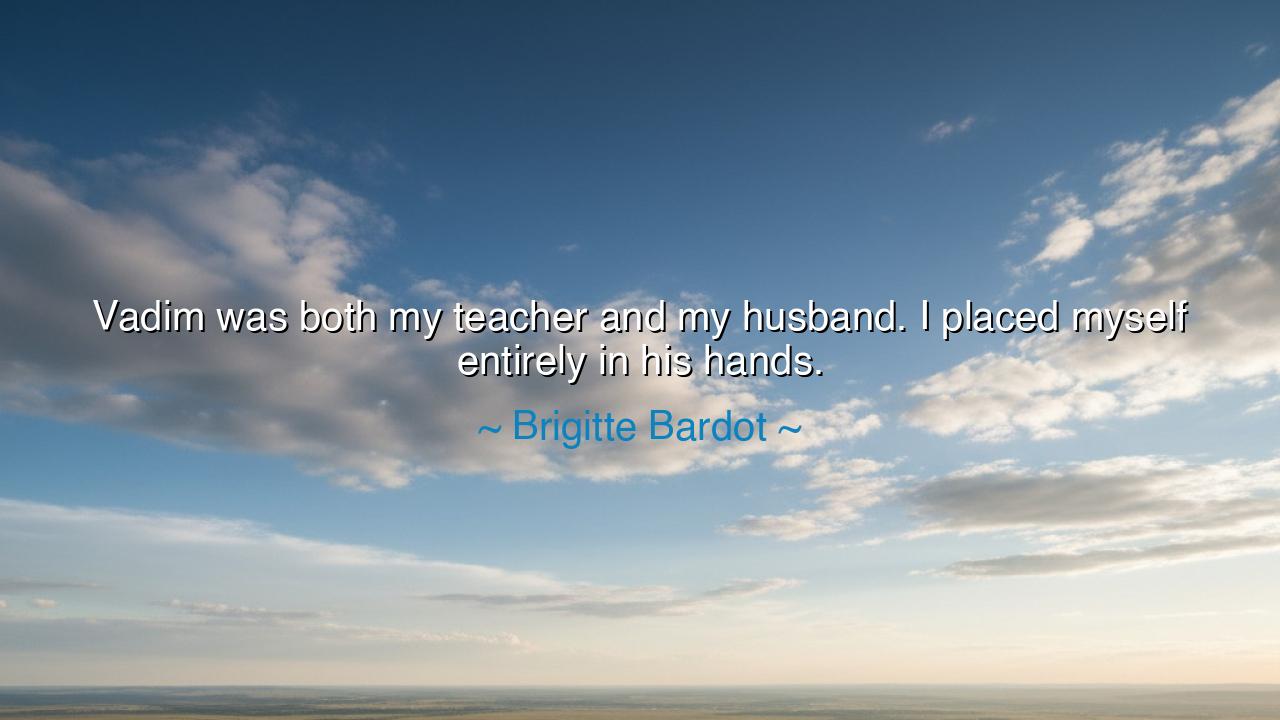
Vadim was both my teacher and my husband. I placed myself






Brigitte Bardot once confessed with candor and vulnerability: “Vadim was both my teacher and my husband. I placed myself entirely in his hands.” These words speak not only of love, but of surrender, of trust, and of the complex bond between guidance and intimacy. They remind us that in life there are moments when the heart and the mind both bend toward another, when we entrust not only our learning but also our being to someone else. In such surrender lies both beauty and danger, for to give oneself fully is to risk both elevation and loss.
The meaning of this quote rests in the dual role that Roger Vadim played in Bardot’s life. He was her mentor, shaping her as an artist, guiding her steps into the world of cinema, and awakening within her the confidence to inhabit the screen. Yet he was also her companion in love, the one with whom she shared her most intimate affections. To combine teacher and husband is to entwine knowledge with passion, instruction with desire. Such a union can bring forth greatness, for it binds discipline with inspiration, but it can also bring turmoil, for power and vulnerability intertwine.
The origin of these words lies in the early years of Bardot’s career. As a young woman, she entered the world of film under the guidance of Vadim, who not only directed her but also shaped her image. Their union was not merely of the heart, but of destiny, for through him she emerged as an icon of beauty and freedom in post-war France. Her surrender to his guidance was not weakness but a kind of apprenticeship, where the fire of talent was kindled by the hand of another.
History offers us other tales of such unions between love and mentorship. Recall Heloise and Abelard, whose story has echoed for centuries. Abelard was Heloise’s tutor, guiding her in letters and philosophy, yet their bond blossomed into love so profound that it defied convention and brought scandal. Heloise too entrusted herself to her teacher, placing her soul and future in his hands. Their story, like Bardot’s, reveals both the beauty and peril of intertwining the roles of guide and beloved. Such relationships magnify devotion, but also intensify the risks of betrayal and loss.
Bardot’s words also speak of trust—the willingness to give oneself fully to another. In a world often ruled by suspicion, such openness seems rare, even reckless. Yet it is also the soil from which greatness can grow. To say, “I placed myself entirely in his hands,” is to acknowledge the leap of faith that is necessary not only in love but also in learning. Every student, every disciple, must in some measure surrender to the wisdom of the master, just as every lover must surrender to the mystery of the beloved. Without trust, growth and intimacy alike remain stunted.
And yet, there is a caution hidden here. For to place oneself “entirely” in another’s hands is to risk the loss of self. The wise must remember that even as we open ourselves to mentors and lovers, we must preserve the flame of our own identity. Heloise, though shaped by Abelard, remained her own voice in letters; Bardot, though guided by Vadim, grew into her own radiant star. The lesson is not to refuse trust, but to balance it with the courage to stand as oneself.
Therefore, O listener, take from Bardot’s words both inspiration and warning. Do not fear to trust, for trust is the bridge across which both love and wisdom must pass. But do not give away the whole of your soul, for even in intimacy you must guard the spark of your own being. Seek teachers, seek companions, even seek those rare souls who may be both, but remember always that you are not only clay to be shaped—you are also fire to be kindled.
So let Bardot’s remembrance become your teaching: that the bonds of teacher and husband, of mentor and beloved, can shape destinies and awaken greatness. Yet they require courage, humility, and discernment. Give yourself with trust, but also with wisdom. For to entrust yourself entirely is to risk much—but without such risk, there can be no true growth, no true love, and no true transformation.






AAdministratorAdministrator
Welcome, honored guests. Please leave a comment, we will respond soon